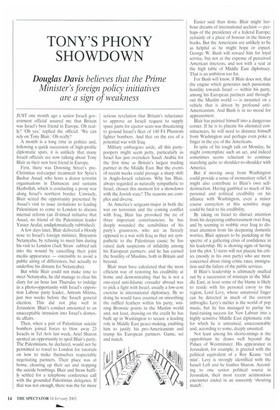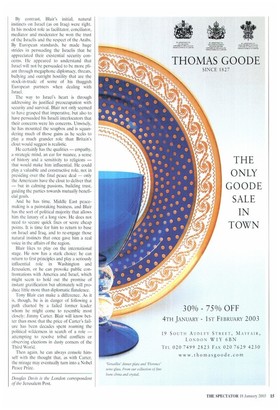TONY'S PHONY SHOWDOWN
Douglas Davis believes that the Prime
Minister's foreign policy initiatives are a sign of weakness
JUST one month ago a senior Israeli government official assured me that Britain was Israel's best friend in Europe. Oh really? 'Oh yes,' replied the official. We can rely on Tony Blair.' Oh really?
A month is a long time in politics and, following a quick succession of high-profile diplomatic spats, it is unlikely that many Israeli officials are now talking about Tony Blair as their new best friend in Europe.
First, there was Downing Street's preChristmas red-carpet treatment for Syria's Bashar Assad. who hosts a dozen terrorist organisations in Damascus and sustains Hezbollah, which is conducting a proxy war along Israel's northern border. Unwisely, Blair seized the opportunity presented by Assad's visit to issue invitations to leading Palestinians to come to London to discuss internal reform (an ill-timed initiative that Assad, no friend of the Palestinian leader Yasser Arafat, undiplomatically rubbished).
A few days later, Blair delivered a bloody nose to Israel's foreign minister, Binyamin Netanyahu, by refusing to meet him during his visit to London (Jack Straw rubbed salt into the wound by cancelling their joint media appearance — ostensibly to avoid a public airing of differences, but actually to underline his distaste for Netanyahu).
But while Blair could not make time to meet Netanyahu, he did manage to clear his diary for an hour last Thursday to indulge in a photo-opportunity with Israel's opposition Labour party leader, Amram Mitzna, just two weeks before the Israeli general election. This did not play well in Jerusalem. Blair's conduct amounted to an unacceptable intrusion into Israel's domestic affairs.
Then, when a pair of Palestinian suicide bombers joined forces to blow away 23 Israelis in Tel Aviv last week, Arid l Sharon spotted an opportunity to spoil Blair's party. The Palestinians, he declared, would not be permitted to travel to London for tutorials on how to make themselves respectable negotiating partners. Their place was at home, cleaning up their act and stopping the suicide bombings. Blair and Straw huffily settled for a telephone conference call with the grounded Palestinian delegates. If that was not enough, there was the far more serious revelation that Britain's reluctance to approve an Israeli request to supply spare parts for ejector seats was threatening to ground Israel's fleet of 140 F4 Phantom fighter bombers. And that on the eve of a potential war with Iraq.
Military embargoes aside, all this partypoopery might seem petty, particularly as Israel has just overtaken Saudi Arabia for the first time as Britain's largest trading partner in the Middle East. But the events of recent weeks could presage a sharp shift in Anglo-Israeli relations. Why has Blair, always regarded as naturally sympathetic to Israel, chosen this moment for a showdown with the Jewish state? The reasons are complex and diverse.
As America's sergeant-major in both the war on terrorism and the coming conflict with Iraq, Blair has provoked the ire of three important constituencies: he has deeply wounded the sensibilities of his party's grassroots, who are as fiercely opposed to a war with Iraq as they are sympathetic to the Palestinian cause; he has raised dark suspicions of infidelity among his European partners: and he has earned the hostility of Muslims, both in Britain and beyond.
Blair must have calculated that the most efficient way of restoring his credibility at home and demonstrating that he is not a one-eyed anti-Islamic crusader abroad was to pick a fight with Israel, usually a low-cost exercise in international diplomacy. By so doing he would have counted on smoothing the ruffled feathers within his party, winning Brownie points in the Muslim world and, not least, drawing on the credit he has built up in Washington to secure a leading role in Middle East peace-making, enabling him to justify his pro-Americanism and trump his European partners. Game, set and match. Easier said than done. Blair might harbour dreams of international acclaim — perhaps of the presidency of a federal Europe; certainly of a place of honour in the history books. But the Americans are unlikely to be as helpful as he might hope or expect. George W. Bush will reward him for loyal service, but not at the expense of perceived American interests, and not with a seat at the high table of Middle East diplomacy. That is an ambition too far.
For Bush will know, if Blair does not, that the engine which generates such passionate hostility towards Israel — within his party, among his European partners and throughout the Muslim world — is mounted on a vehicle that is driven by profound antiAmericanism. And Bush is in no mood for appeasement.
Blair has painted himself into a dangerous corner. If he is to placate his alienated constituencies, he will need to distance himself from Washington and perhaps even poke a finger in the eye of the Americans.
In spite of his tough talk on Monday, he might contemplate such an act, and indeed sometimes seems reluctant to continue marching quite so shoulder-to-shoulder with America.
But if moving away from Washington could provide a sense of momentary relief, it might also contribute to Blair's own selfdestruction. Having gambled so much of his personal and political credibility on his alliance with Washington, even a minor course correction at this sensitive stage could be fatal to his credibility.
By taking on Israel to distract attention from his deepening embarrassment over Iraq, and by seeming to wobble over Iraq to distract attention from his deepening domestic worries, Blair appears to be panicking at the spectre of a gathering crisis of confidence in his leadership. He is showing signs of having lost the plot. U-turns will not placate his critics (mostly in his own party) who are more concerned about rising crime rates, immigration and the failure of the public services.
If Blair's leadership is ultimately snuffed Out by a succession of missteps in the Middle East, at least some of the blame is likely to reside with his personal envoy to the region, Lord Levy, whose untutored finger can be detected in much of the current imbroglio. Levy's métier is the world of pop music, but he has managed to parlay his fund-raising success for New Labour into a highly sensitive Middle East diplomatic role for which he is untrained, unaccountable and, according to some, deeply unsuited.
Not least among his shortcomings is the opprobrium he draws well beyond the Palace of Westminster. His appearance in Jerusalem, for example, is greeted with the political equivalent of a Roy Keane 'red mist'. Levy is strongly identified with the Israeli Left and he loathes Sharon. According to one senior political source in Jerusalem, their most recent acrimonious encounter ended in an unseemly 'shouting match'.
By contrast, Blair's initial, natural instincts on Israel (as on Iraq) were right. In his modest role as facilitator, conciliator, mediator and moderator he won the trust of the Israelis and the respect of the Arabs. By European standards, he made huge strides in persuading the Israelis that he appreciated their existential security concerns. He appeared to understand that Israel will not be persuaded to be more pliant through megaphone diplomacy, threats, bullying and outright hostility that are the stock-in-trade of some of his thuggish European partners when dealing with Israel, The way to Israel's heart is through addressing its justified preoccupation with security and survival. Blair not only seemed to have grasped that imperative, but also to have persuaded his Israeli interlocutors that their concerns were his concerns. Unwisely, he has mounted the soapbox and is squandering much of those gains as he seeks to play a much grander role than Britain's clout would suggest is realistic.
He certainly has the qualities — empathy, a strategic mind, an ear for nuance, a sense of history and a sensitivity to religions — that would make him influential. He could play a valuable and constructive role, not in presiding over the final peace deal — only the Americans have the clout to deliver that — but in calming passions, building trust, guiding the parties towards mutually beneficial goals.
And he has time. Middle East peacemaking is a painstaking business, and Blair has the sort of political majority that allows him the luxury of a long view. He does not need to secure quick fixes or score cheap points. It is time for him to return to base on Israel and Iraq, and to re-engage those natural instincts that once gave him a real voice in the affairs of the region.
Blair likes to play on the international stage. He now has a stark choice: he can return to first principles and play a seriously influential role in Washington and Jerusalem, or he can provoke public confrontations with America and Israel, which might seem to hold out the promise of instant gratification but ultimately will produce little more than diplomatic flatulence.
Tony Blair can make a difference. As it is, though, he is in danger of following a path charted by a failed former leader whom he might come to resemble most closely: Jimmy Carter. Blair will know better than most that the price of Carter's failure has been decades spent roaming the political wilderness in search of a role — attempting to resolve tribal conflicts or observing elections in dusty corners of the Third World.
Then again, he can always console himself with the thought that, as with Carter, the mirage may eventually turn into a Nobel Peace Prize.
Douglas Davis is the London correspondent of the Jerusalem Post.



























































 Previous page
Previous page